International Trade, Finance & Investment: UK Economy Analysis Report
VerifiedAdded on 2022/12/28
|15
|3938
|27
Report
AI Summary
This report provides a comprehensive analysis of international trade, finance, and investment, focusing on their impact on the UK economy. It begins by defining key terms and exploring the role of financial markets in allocating capital domestically and internationally. The report delves into the different types of financial markets, including stock, bond, commodities, and derivatives markets, and their significance in economic growth. It examines the UK's financial market, its global standing, and the factors influencing its GDP. The report further investigates capital allocation within the UK economy and its relationship with international trade, including import and export dynamics, and the impact of foreign direct investment. The second part of the report evaluates the Italian economy, its key sectors, economic freedom, and government policies, providing a comparative analysis. The report concludes by summarizing the key findings and highlighting the interconnectedness of international trade, finance, and investment in shaping economic landscapes. The report also presents various charts and interpretations to support the analysis.
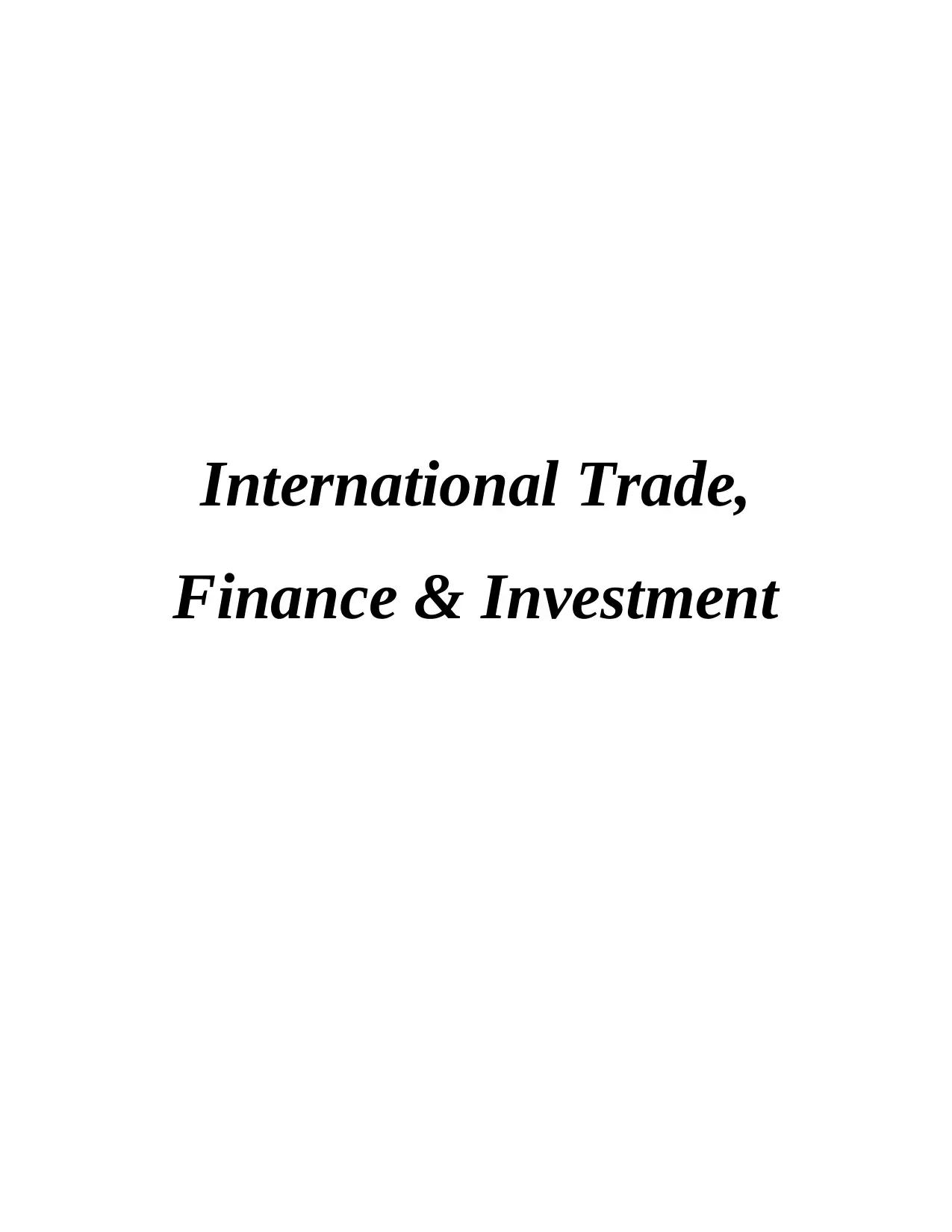
International Trade,
Finance & Investment
Finance & Investment
Paraphrase This Document
Need a fresh take? Get an instant paraphrase of this document with our AI Paraphraser
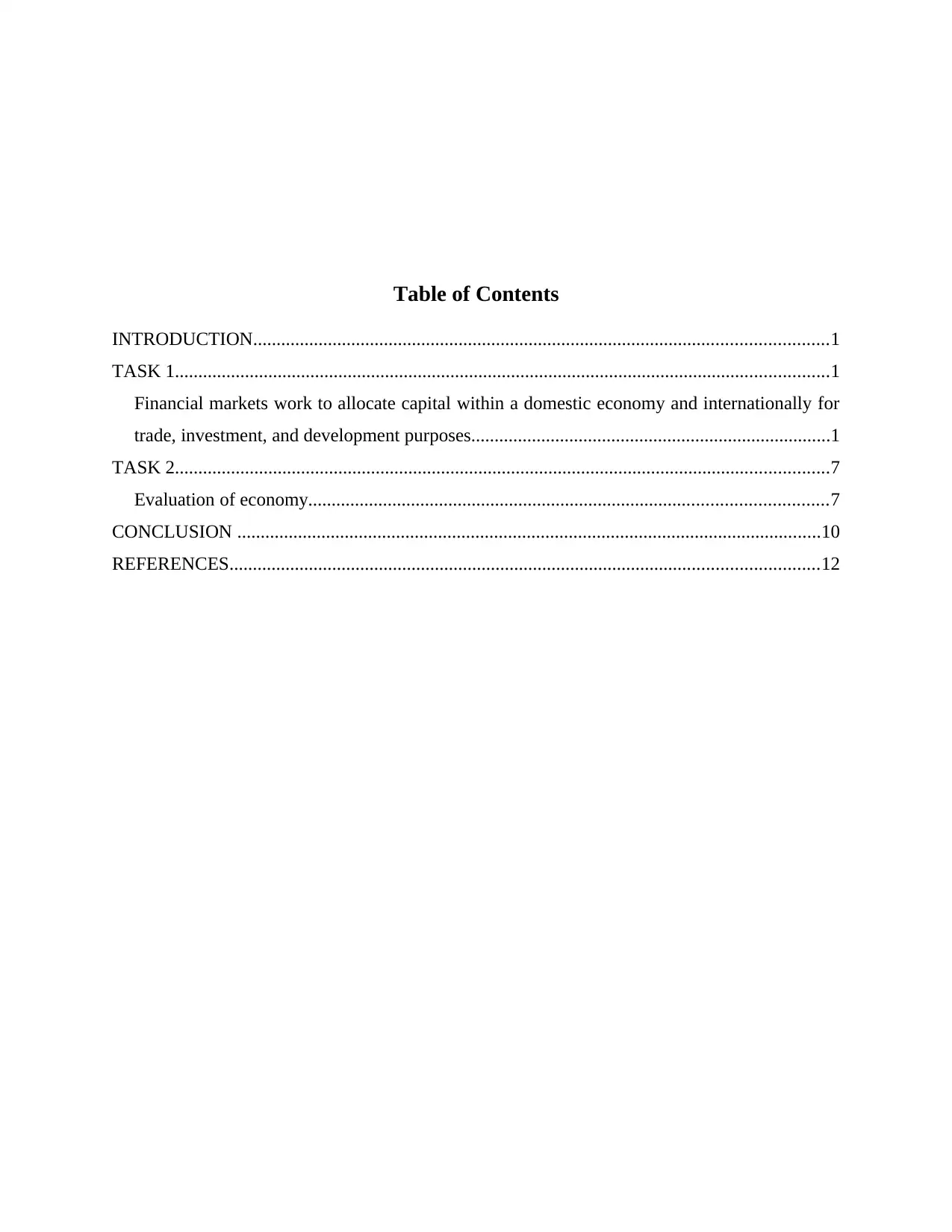
Table of Contents
INTRODUCTION...........................................................................................................................1
TASK 1............................................................................................................................................1
Financial markets work to allocate capital within a domestic economy and internationally for
trade, investment, and development purposes.............................................................................1
TASK 2............................................................................................................................................7
Evaluation of economy...............................................................................................................7
CONCLUSION .............................................................................................................................10
REFERENCES..............................................................................................................................12
INTRODUCTION...........................................................................................................................1
TASK 1............................................................................................................................................1
Financial markets work to allocate capital within a domestic economy and internationally for
trade, investment, and development purposes.............................................................................1
TASK 2............................................................................................................................................7
Evaluation of economy...............................................................................................................7
CONCLUSION .............................................................................................................................10
REFERENCES..............................................................................................................................12
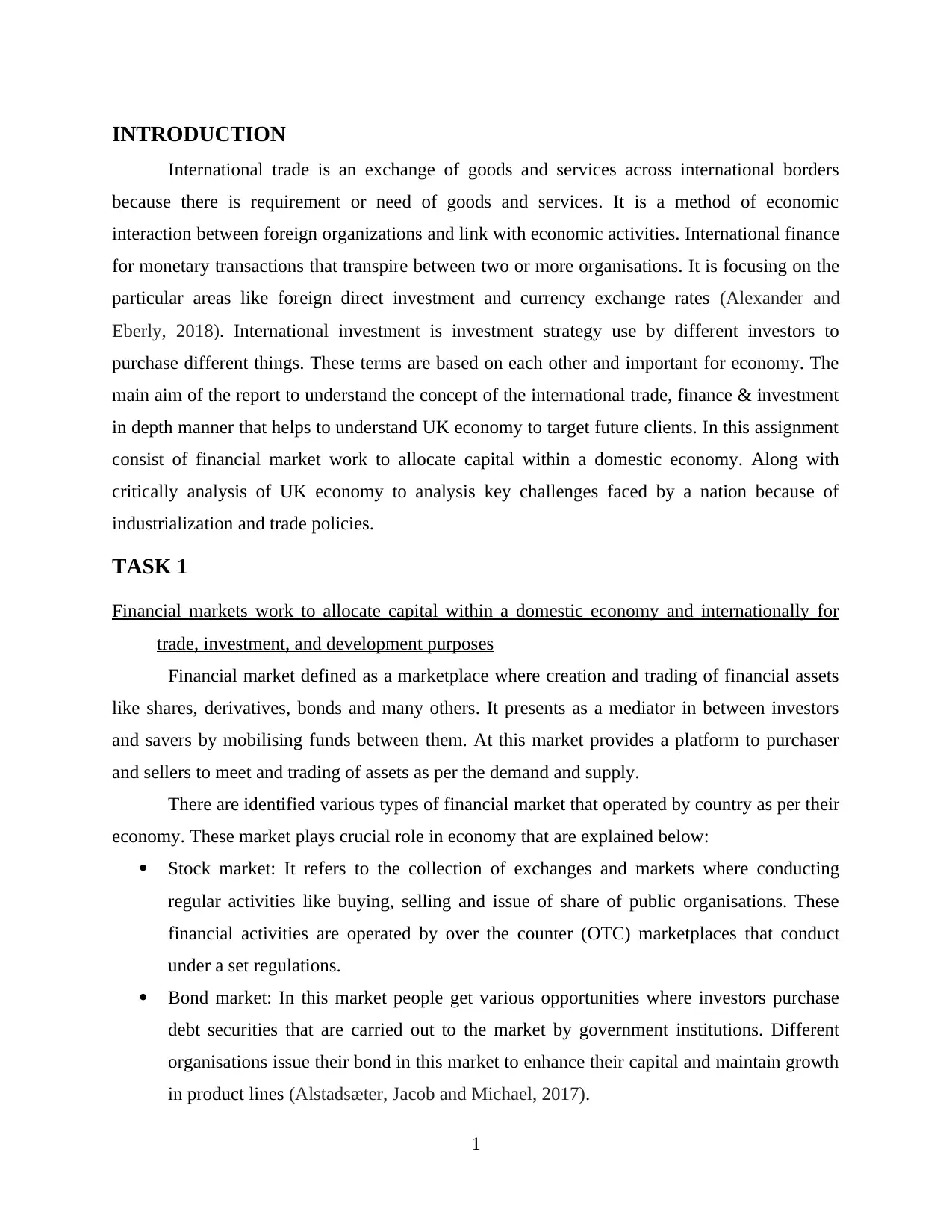
INTRODUCTION
International trade is an exchange of goods and services across international borders
because there is requirement or need of goods and services. It is a method of economic
interaction between foreign organizations and link with economic activities. International finance
for monetary transactions that transpire between two or more organisations. It is focusing on the
particular areas like foreign direct investment and currency exchange rates (Alexander and
Eberly, 2018). International investment is investment strategy use by different investors to
purchase different things. These terms are based on each other and important for economy. The
main aim of the report to understand the concept of the international trade, finance & investment
in depth manner that helps to understand UK economy to target future clients. In this assignment
consist of financial market work to allocate capital within a domestic economy. Along with
critically analysis of UK economy to analysis key challenges faced by a nation because of
industrialization and trade policies.
TASK 1
Financial markets work to allocate capital within a domestic economy and internationally for
trade, investment, and development purposes
Financial market defined as a marketplace where creation and trading of financial assets
like shares, derivatives, bonds and many others. It presents as a mediator in between investors
and savers by mobilising funds between them. At this market provides a platform to purchaser
and sellers to meet and trading of assets as per the demand and supply.
There are identified various types of financial market that operated by country as per their
economy. These market plays crucial role in economy that are explained below:
Stock market: It refers to the collection of exchanges and markets where conducting
regular activities like buying, selling and issue of share of public organisations. These
financial activities are operated by over the counter (OTC) marketplaces that conduct
under a set regulations.
Bond market: In this market people get various opportunities where investors purchase
debt securities that are carried out to the market by government institutions. Different
organisations issue their bond in this market to enhance their capital and maintain growth
in product lines (Alstadsæter, Jacob and Michael, 2017).
1
International trade is an exchange of goods and services across international borders
because there is requirement or need of goods and services. It is a method of economic
interaction between foreign organizations and link with economic activities. International finance
for monetary transactions that transpire between two or more organisations. It is focusing on the
particular areas like foreign direct investment and currency exchange rates (Alexander and
Eberly, 2018). International investment is investment strategy use by different investors to
purchase different things. These terms are based on each other and important for economy. The
main aim of the report to understand the concept of the international trade, finance & investment
in depth manner that helps to understand UK economy to target future clients. In this assignment
consist of financial market work to allocate capital within a domestic economy. Along with
critically analysis of UK economy to analysis key challenges faced by a nation because of
industrialization and trade policies.
TASK 1
Financial markets work to allocate capital within a domestic economy and internationally for
trade, investment, and development purposes
Financial market defined as a marketplace where creation and trading of financial assets
like shares, derivatives, bonds and many others. It presents as a mediator in between investors
and savers by mobilising funds between them. At this market provides a platform to purchaser
and sellers to meet and trading of assets as per the demand and supply.
There are identified various types of financial market that operated by country as per their
economy. These market plays crucial role in economy that are explained below:
Stock market: It refers to the collection of exchanges and markets where conducting
regular activities like buying, selling and issue of share of public organisations. These
financial activities are operated by over the counter (OTC) marketplaces that conduct
under a set regulations.
Bond market: In this market people get various opportunities where investors purchase
debt securities that are carried out to the market by government institutions. Different
organisations issue their bond in this market to enhance their capital and maintain growth
in product lines (Alstadsæter, Jacob and Michael, 2017).
1
⊘ This is a preview!⊘
Do you want full access?
Subscribe today to unlock all pages.

Trusted by 1+ million students worldwide
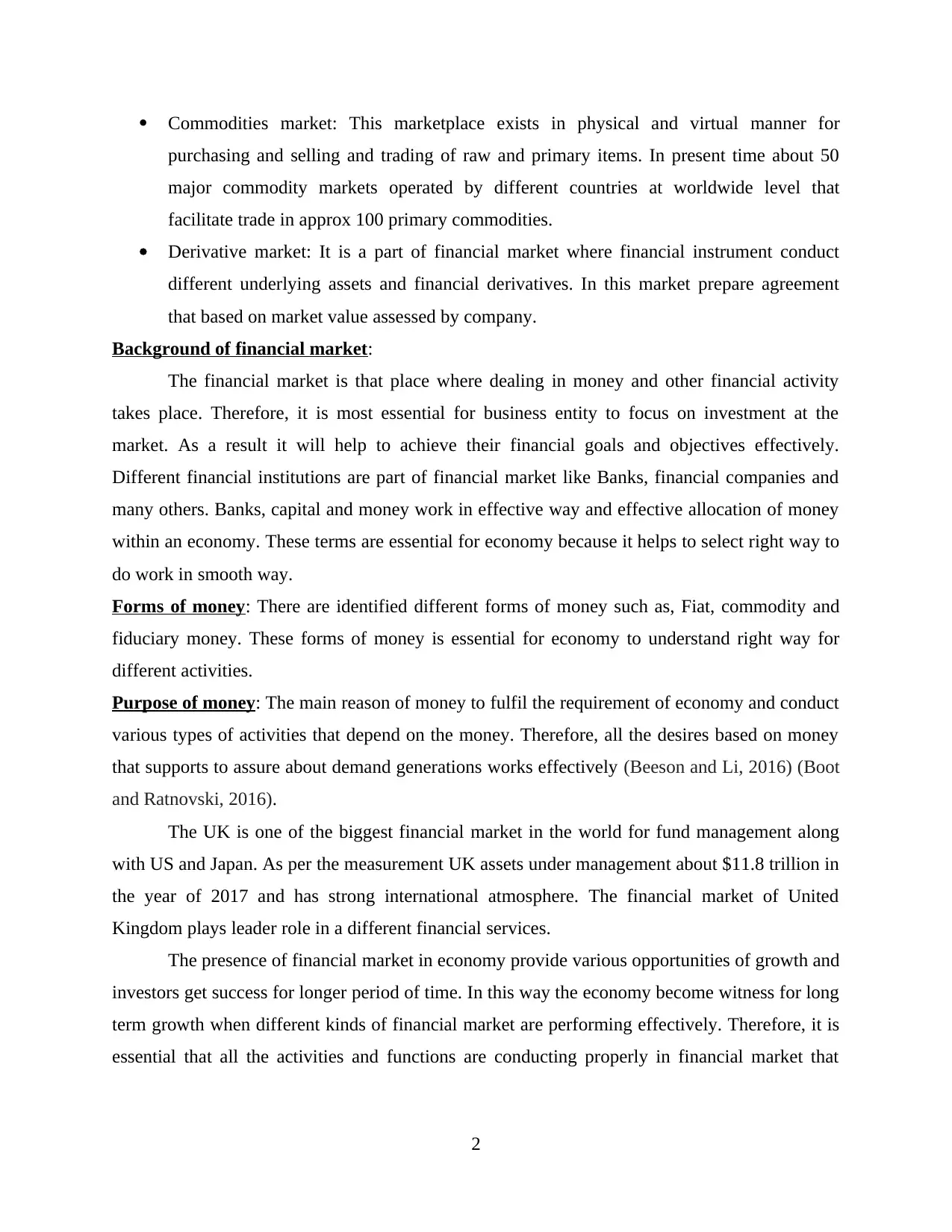
Commodities market: This marketplace exists in physical and virtual manner for
purchasing and selling and trading of raw and primary items. In present time about 50
major commodity markets operated by different countries at worldwide level that
facilitate trade in approx 100 primary commodities.
Derivative market: It is a part of financial market where financial instrument conduct
different underlying assets and financial derivatives. In this market prepare agreement
that based on market value assessed by company.
Background of financial market:
The financial market is that place where dealing in money and other financial activity
takes place. Therefore, it is most essential for business entity to focus on investment at the
market. As a result it will help to achieve their financial goals and objectives effectively.
Different financial institutions are part of financial market like Banks, financial companies and
many others. Banks, capital and money work in effective way and effective allocation of money
within an economy. These terms are essential for economy because it helps to select right way to
do work in smooth way.
Forms of money: There are identified different forms of money such as, Fiat, commodity and
fiduciary money. These forms of money is essential for economy to understand right way for
different activities.
Purpose of money: The main reason of money to fulfil the requirement of economy and conduct
various types of activities that depend on the money. Therefore, all the desires based on money
that supports to assure about demand generations works effectively (Beeson and Li, 2016) (Boot
and Ratnovski, 2016).
The UK is one of the biggest financial market in the world for fund management along
with US and Japan. As per the measurement UK assets under management about $11.8 trillion in
the year of 2017 and has strong international atmosphere. The financial market of United
Kingdom plays leader role in a different financial services.
The presence of financial market in economy provide various opportunities of growth and
investors get success for longer period of time. In this way the economy become witness for long
term growth when different kinds of financial market are performing effectively. Therefore, it is
essential that all the activities and functions are conducting properly in financial market that
2
purchasing and selling and trading of raw and primary items. In present time about 50
major commodity markets operated by different countries at worldwide level that
facilitate trade in approx 100 primary commodities.
Derivative market: It is a part of financial market where financial instrument conduct
different underlying assets and financial derivatives. In this market prepare agreement
that based on market value assessed by company.
Background of financial market:
The financial market is that place where dealing in money and other financial activity
takes place. Therefore, it is most essential for business entity to focus on investment at the
market. As a result it will help to achieve their financial goals and objectives effectively.
Different financial institutions are part of financial market like Banks, financial companies and
many others. Banks, capital and money work in effective way and effective allocation of money
within an economy. These terms are essential for economy because it helps to select right way to
do work in smooth way.
Forms of money: There are identified different forms of money such as, Fiat, commodity and
fiduciary money. These forms of money is essential for economy to understand right way for
different activities.
Purpose of money: The main reason of money to fulfil the requirement of economy and conduct
various types of activities that depend on the money. Therefore, all the desires based on money
that supports to assure about demand generations works effectively (Beeson and Li, 2016) (Boot
and Ratnovski, 2016).
The UK is one of the biggest financial market in the world for fund management along
with US and Japan. As per the measurement UK assets under management about $11.8 trillion in
the year of 2017 and has strong international atmosphere. The financial market of United
Kingdom plays leader role in a different financial services.
The presence of financial market in economy provide various opportunities of growth and
investors get success for longer period of time. In this way the economy become witness for long
term growth when different kinds of financial market are performing effectively. Therefore, it is
essential that all the activities and functions are conducting properly in financial market that
2
Paraphrase This Document
Need a fresh take? Get an instant paraphrase of this document with our AI Paraphraser
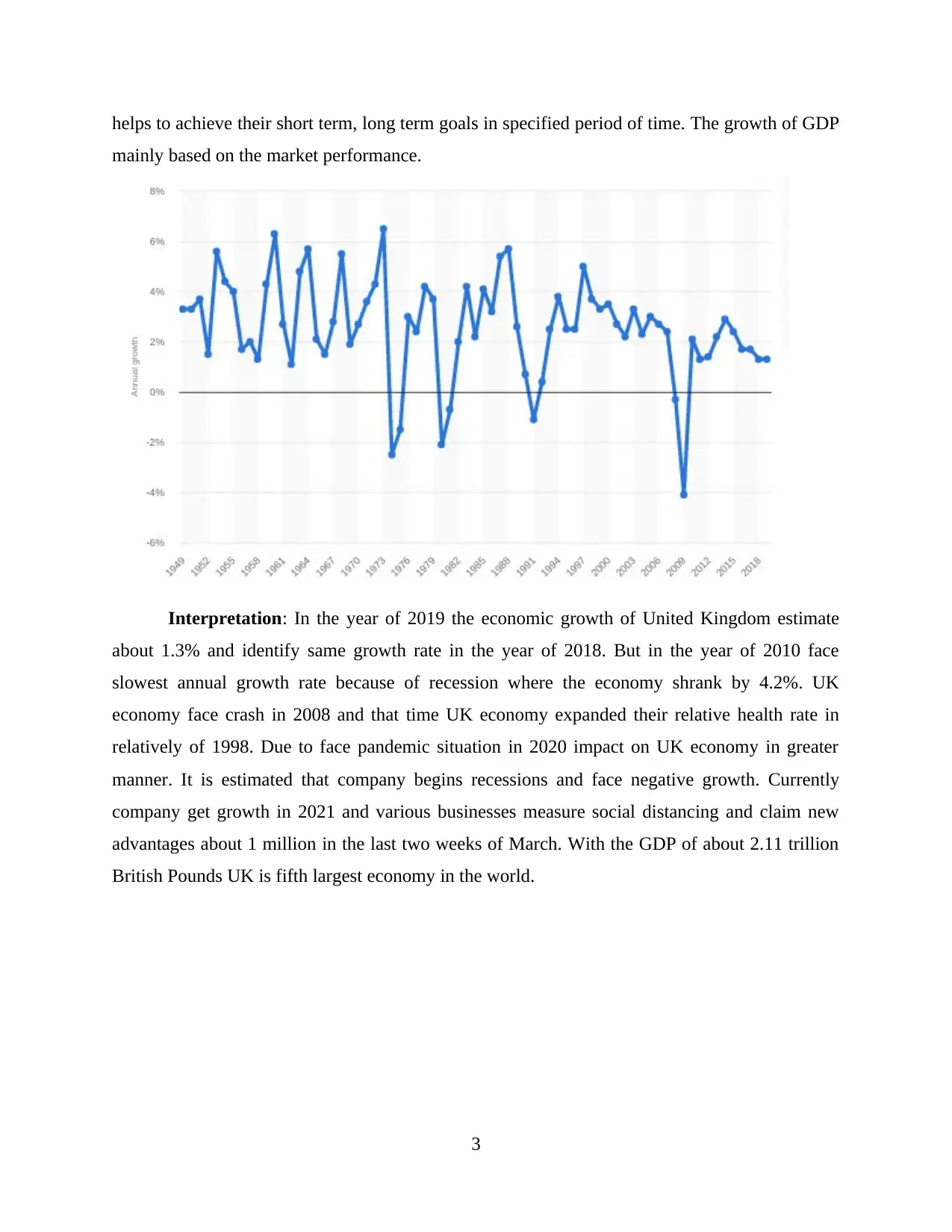
helps to achieve their short term, long term goals in specified period of time. The growth of GDP
mainly based on the market performance.
Interpretation: In the year of 2019 the economic growth of United Kingdom estimate
about 1.3% and identify same growth rate in the year of 2018. But in the year of 2010 face
slowest annual growth rate because of recession where the economy shrank by 4.2%. UK
economy face crash in 2008 and that time UK economy expanded their relative health rate in
relatively of 1998. Due to face pandemic situation in 2020 impact on UK economy in greater
manner. It is estimated that company begins recessions and face negative growth. Currently
company get growth in 2021 and various businesses measure social distancing and claim new
advantages about 1 million in the last two weeks of March. With the GDP of about 2.11 trillion
British Pounds UK is fifth largest economy in the world.
3
mainly based on the market performance.
Interpretation: In the year of 2019 the economic growth of United Kingdom estimate
about 1.3% and identify same growth rate in the year of 2018. But in the year of 2010 face
slowest annual growth rate because of recession where the economy shrank by 4.2%. UK
economy face crash in 2008 and that time UK economy expanded their relative health rate in
relatively of 1998. Due to face pandemic situation in 2020 impact on UK economy in greater
manner. It is estimated that company begins recessions and face negative growth. Currently
company get growth in 2021 and various businesses measure social distancing and claim new
advantages about 1 million in the last two weeks of March. With the GDP of about 2.11 trillion
British Pounds UK is fifth largest economy in the world.
3
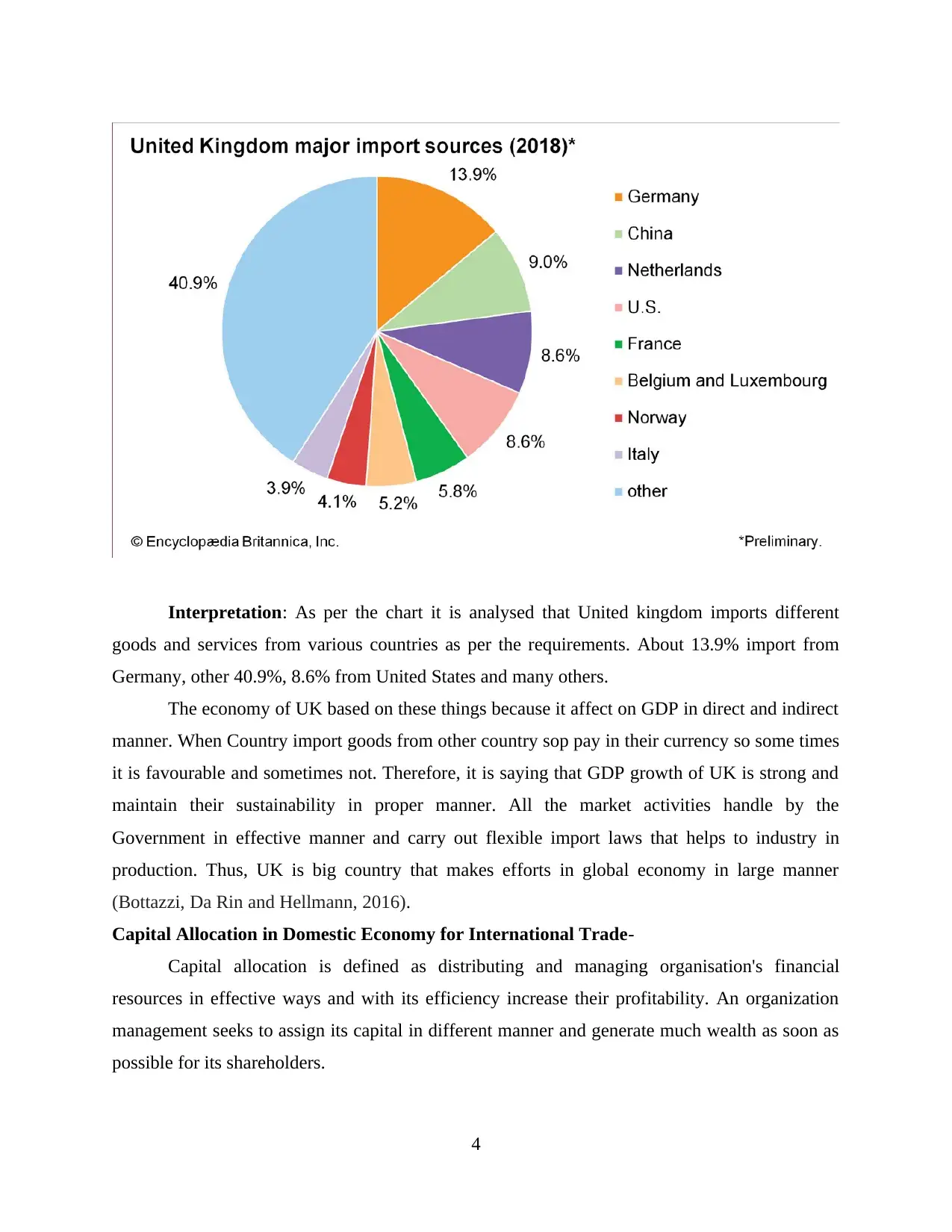
Interpretation: As per the chart it is analysed that United kingdom imports different
goods and services from various countries as per the requirements. About 13.9% import from
Germany, other 40.9%, 8.6% from United States and many others.
The economy of UK based on these things because it affect on GDP in direct and indirect
manner. When Country import goods from other country sop pay in their currency so some times
it is favourable and sometimes not. Therefore, it is saying that GDP growth of UK is strong and
maintain their sustainability in proper manner. All the market activities handle by the
Government in effective manner and carry out flexible import laws that helps to industry in
production. Thus, UK is big country that makes efforts in global economy in large manner
(Bottazzi, Da Rin and Hellmann, 2016).
Capital Allocation in Domestic Economy for International Trade-
Capital allocation is defined as distributing and managing organisation's financial
resources in effective ways and with its efficiency increase their profitability. An organization
management seeks to assign its capital in different manner and generate much wealth as soon as
possible for its shareholders.
4
goods and services from various countries as per the requirements. About 13.9% import from
Germany, other 40.9%, 8.6% from United States and many others.
The economy of UK based on these things because it affect on GDP in direct and indirect
manner. When Country import goods from other country sop pay in their currency so some times
it is favourable and sometimes not. Therefore, it is saying that GDP growth of UK is strong and
maintain their sustainability in proper manner. All the market activities handle by the
Government in effective manner and carry out flexible import laws that helps to industry in
production. Thus, UK is big country that makes efforts in global economy in large manner
(Bottazzi, Da Rin and Hellmann, 2016).
Capital Allocation in Domestic Economy for International Trade-
Capital allocation is defined as distributing and managing organisation's financial
resources in effective ways and with its efficiency increase their profitability. An organization
management seeks to assign its capital in different manner and generate much wealth as soon as
possible for its shareholders.
4
⊘ This is a preview!⊘
Do you want full access?
Subscribe today to unlock all pages.

Trusted by 1+ million students worldwide
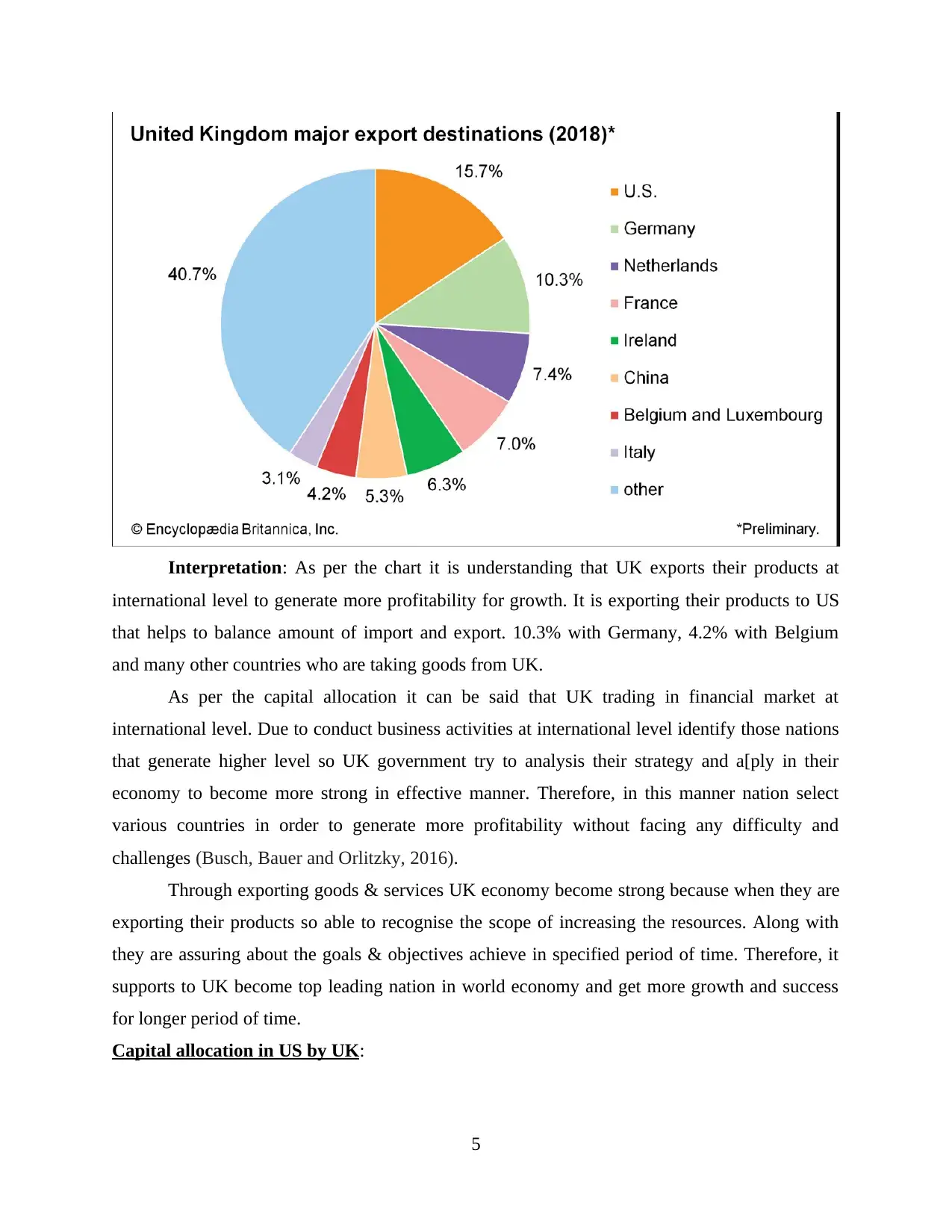
Interpretation: As per the chart it is understanding that UK exports their products at
international level to generate more profitability for growth. It is exporting their products to US
that helps to balance amount of import and export. 10.3% with Germany, 4.2% with Belgium
and many other countries who are taking goods from UK.
As per the capital allocation it can be said that UK trading in financial market at
international level. Due to conduct business activities at international level identify those nations
that generate higher level so UK government try to analysis their strategy and a[ply in their
economy to become more strong in effective manner. Therefore, in this manner nation select
various countries in order to generate more profitability without facing any difficulty and
challenges (Busch, Bauer and Orlitzky, 2016).
Through exporting goods & services UK economy become strong because when they are
exporting their products so able to recognise the scope of increasing the resources. Along with
they are assuring about the goals & objectives achieve in specified period of time. Therefore, it
supports to UK become top leading nation in world economy and get more growth and success
for longer period of time.
Capital allocation in US by UK:
5
international level to generate more profitability for growth. It is exporting their products to US
that helps to balance amount of import and export. 10.3% with Germany, 4.2% with Belgium
and many other countries who are taking goods from UK.
As per the capital allocation it can be said that UK trading in financial market at
international level. Due to conduct business activities at international level identify those nations
that generate higher level so UK government try to analysis their strategy and a[ply in their
economy to become more strong in effective manner. Therefore, in this manner nation select
various countries in order to generate more profitability without facing any difficulty and
challenges (Busch, Bauer and Orlitzky, 2016).
Through exporting goods & services UK economy become strong because when they are
exporting their products so able to recognise the scope of increasing the resources. Along with
they are assuring about the goals & objectives achieve in specified period of time. Therefore, it
supports to UK become top leading nation in world economy and get more growth and success
for longer period of time.
Capital allocation in US by UK:
5
Paraphrase This Document
Need a fresh take? Get an instant paraphrase of this document with our AI Paraphraser
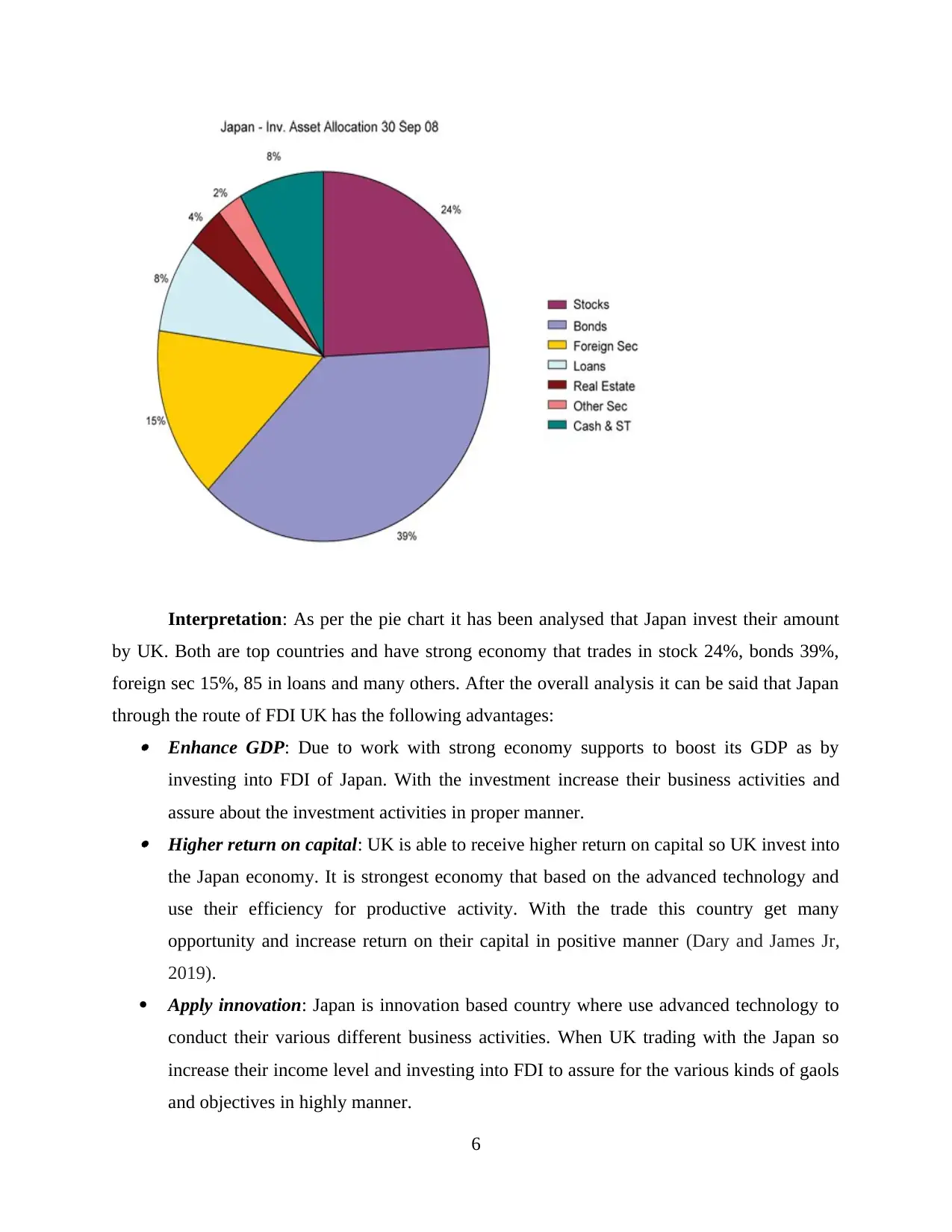
Interpretation: As per the pie chart it has been analysed that Japan invest their amount
by UK. Both are top countries and have strong economy that trades in stock 24%, bonds 39%,
foreign sec 15%, 85 in loans and many others. After the overall analysis it can be said that Japan
through the route of FDI UK has the following advantages: Enhance GDP: Due to work with strong economy supports to boost its GDP as by
investing into FDI of Japan. With the investment increase their business activities and
assure about the investment activities in proper manner. Higher return on capital: UK is able to receive higher return on capital so UK invest into
the Japan economy. It is strongest economy that based on the advanced technology and
use their efficiency for productive activity. With the trade this country get many
opportunity and increase return on their capital in positive manner (Dary and James Jr,
2019).
Apply innovation: Japan is innovation based country where use advanced technology to
conduct their various different business activities. When UK trading with the Japan so
increase their income level and investing into FDI to assure for the various kinds of gaols
and objectives in highly manner.
6
by UK. Both are top countries and have strong economy that trades in stock 24%, bonds 39%,
foreign sec 15%, 85 in loans and many others. After the overall analysis it can be said that Japan
through the route of FDI UK has the following advantages: Enhance GDP: Due to work with strong economy supports to boost its GDP as by
investing into FDI of Japan. With the investment increase their business activities and
assure about the investment activities in proper manner. Higher return on capital: UK is able to receive higher return on capital so UK invest into
the Japan economy. It is strongest economy that based on the advanced technology and
use their efficiency for productive activity. With the trade this country get many
opportunity and increase return on their capital in positive manner (Dary and James Jr,
2019).
Apply innovation: Japan is innovation based country where use advanced technology to
conduct their various different business activities. When UK trading with the Japan so
increase their income level and investing into FDI to assure for the various kinds of gaols
and objectives in highly manner.
6
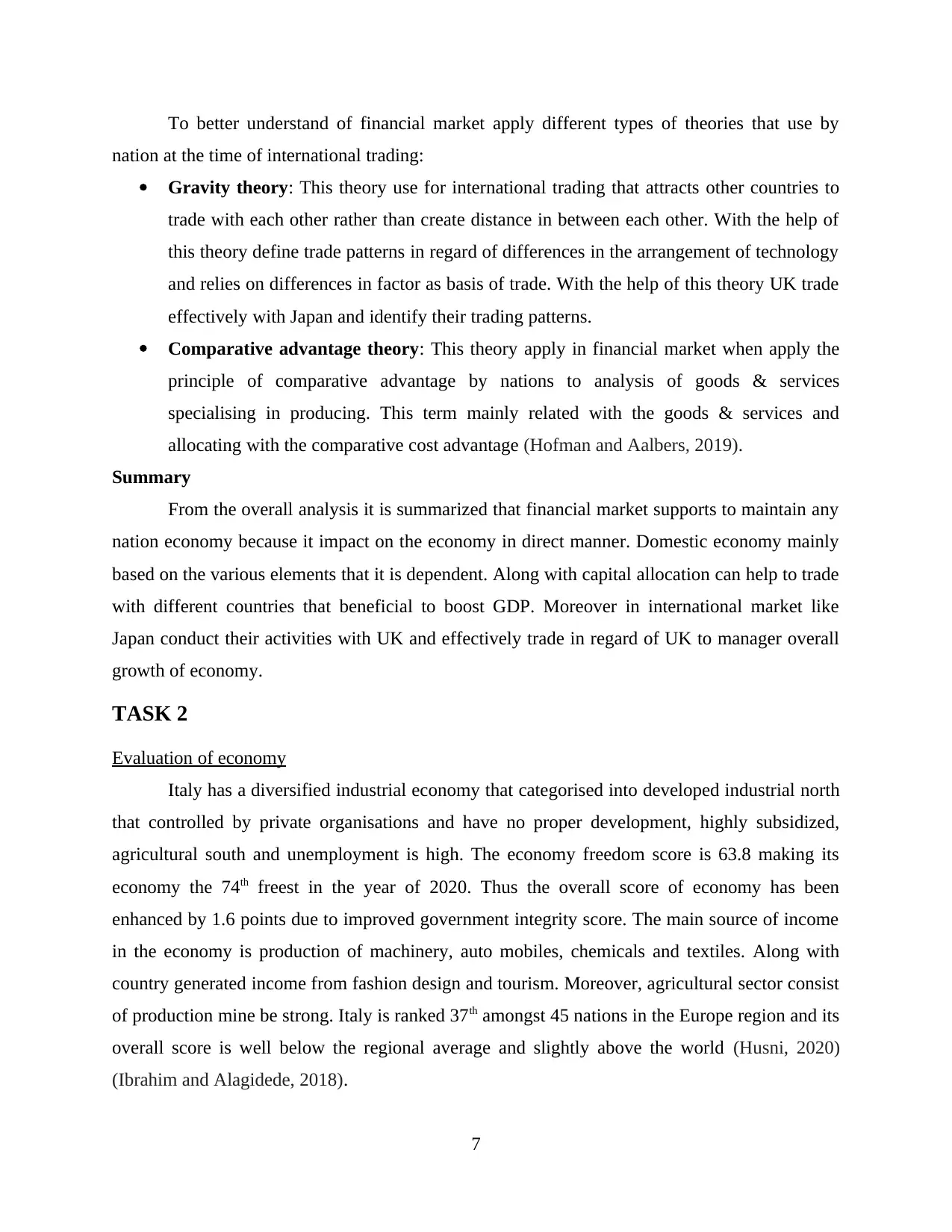
To better understand of financial market apply different types of theories that use by
nation at the time of international trading:
Gravity theory: This theory use for international trading that attracts other countries to
trade with each other rather than create distance in between each other. With the help of
this theory define trade patterns in regard of differences in the arrangement of technology
and relies on differences in factor as basis of trade. With the help of this theory UK trade
effectively with Japan and identify their trading patterns.
Comparative advantage theory: This theory apply in financial market when apply the
principle of comparative advantage by nations to analysis of goods & services
specialising in producing. This term mainly related with the goods & services and
allocating with the comparative cost advantage (Hofman and Aalbers, 2019).
Summary
From the overall analysis it is summarized that financial market supports to maintain any
nation economy because it impact on the economy in direct manner. Domestic economy mainly
based on the various elements that it is dependent. Along with capital allocation can help to trade
with different countries that beneficial to boost GDP. Moreover in international market like
Japan conduct their activities with UK and effectively trade in regard of UK to manager overall
growth of economy.
TASK 2
Evaluation of economy
Italy has a diversified industrial economy that categorised into developed industrial north
that controlled by private organisations and have no proper development, highly subsidized,
agricultural south and unemployment is high. The economy freedom score is 63.8 making its
economy the 74th freest in the year of 2020. Thus the overall score of economy has been
enhanced by 1.6 points due to improved government integrity score. The main source of income
in the economy is production of machinery, auto mobiles, chemicals and textiles. Along with
country generated income from fashion design and tourism. Moreover, agricultural sector consist
of production mine be strong. Italy is ranked 37th amongst 45 nations in the Europe region and its
overall score is well below the regional average and slightly above the world (Husni, 2020)
(Ibrahim and Alagidede, 2018).
7
nation at the time of international trading:
Gravity theory: This theory use for international trading that attracts other countries to
trade with each other rather than create distance in between each other. With the help of
this theory define trade patterns in regard of differences in the arrangement of technology
and relies on differences in factor as basis of trade. With the help of this theory UK trade
effectively with Japan and identify their trading patterns.
Comparative advantage theory: This theory apply in financial market when apply the
principle of comparative advantage by nations to analysis of goods & services
specialising in producing. This term mainly related with the goods & services and
allocating with the comparative cost advantage (Hofman and Aalbers, 2019).
Summary
From the overall analysis it is summarized that financial market supports to maintain any
nation economy because it impact on the economy in direct manner. Domestic economy mainly
based on the various elements that it is dependent. Along with capital allocation can help to trade
with different countries that beneficial to boost GDP. Moreover in international market like
Japan conduct their activities with UK and effectively trade in regard of UK to manager overall
growth of economy.
TASK 2
Evaluation of economy
Italy has a diversified industrial economy that categorised into developed industrial north
that controlled by private organisations and have no proper development, highly subsidized,
agricultural south and unemployment is high. The economy freedom score is 63.8 making its
economy the 74th freest in the year of 2020. Thus the overall score of economy has been
enhanced by 1.6 points due to improved government integrity score. The main source of income
in the economy is production of machinery, auto mobiles, chemicals and textiles. Along with
country generated income from fashion design and tourism. Moreover, agricultural sector consist
of production mine be strong. Italy is ranked 37th amongst 45 nations in the Europe region and its
overall score is well below the regional average and slightly above the world (Husni, 2020)
(Ibrahim and Alagidede, 2018).
7
⊘ This is a preview!⊘
Do you want full access?
Subscribe today to unlock all pages.

Trusted by 1+ million students worldwide
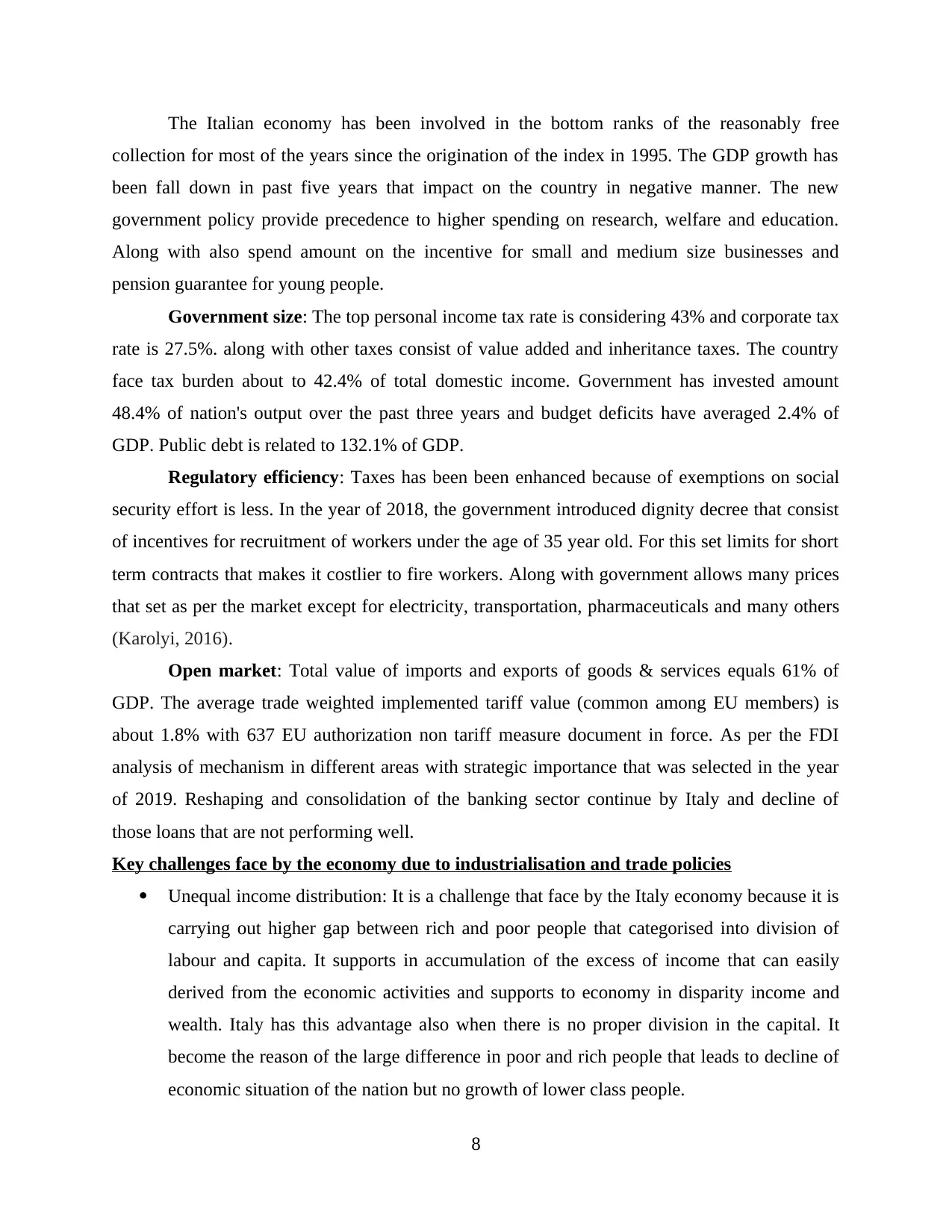
The Italian economy has been involved in the bottom ranks of the reasonably free
collection for most of the years since the origination of the index in 1995. The GDP growth has
been fall down in past five years that impact on the country in negative manner. The new
government policy provide precedence to higher spending on research, welfare and education.
Along with also spend amount on the incentive for small and medium size businesses and
pension guarantee for young people.
Government size: The top personal income tax rate is considering 43% and corporate tax
rate is 27.5%. along with other taxes consist of value added and inheritance taxes. The country
face tax burden about to 42.4% of total domestic income. Government has invested amount
48.4% of nation's output over the past three years and budget deficits have averaged 2.4% of
GDP. Public debt is related to 132.1% of GDP.
Regulatory efficiency: Taxes has been been enhanced because of exemptions on social
security effort is less. In the year of 2018, the government introduced dignity decree that consist
of incentives for recruitment of workers under the age of 35 year old. For this set limits for short
term contracts that makes it costlier to fire workers. Along with government allows many prices
that set as per the market except for electricity, transportation, pharmaceuticals and many others
(Karolyi, 2016).
Open market: Total value of imports and exports of goods & services equals 61% of
GDP. The average trade weighted implemented tariff value (common among EU members) is
about 1.8% with 637 EU authorization non tariff measure document in force. As per the FDI
analysis of mechanism in different areas with strategic importance that was selected in the year
of 2019. Reshaping and consolidation of the banking sector continue by Italy and decline of
those loans that are not performing well.
Key challenges face by the economy due to industrialisation and trade policies
Unequal income distribution: It is a challenge that face by the Italy economy because it is
carrying out higher gap between rich and poor people that categorised into division of
labour and capita. It supports in accumulation of the excess of income that can easily
derived from the economic activities and supports to economy in disparity income and
wealth. Italy has this advantage also when there is no proper division in the capital. It
become the reason of the large difference in poor and rich people that leads to decline of
economic situation of the nation but no growth of lower class people.
8
collection for most of the years since the origination of the index in 1995. The GDP growth has
been fall down in past five years that impact on the country in negative manner. The new
government policy provide precedence to higher spending on research, welfare and education.
Along with also spend amount on the incentive for small and medium size businesses and
pension guarantee for young people.
Government size: The top personal income tax rate is considering 43% and corporate tax
rate is 27.5%. along with other taxes consist of value added and inheritance taxes. The country
face tax burden about to 42.4% of total domestic income. Government has invested amount
48.4% of nation's output over the past three years and budget deficits have averaged 2.4% of
GDP. Public debt is related to 132.1% of GDP.
Regulatory efficiency: Taxes has been been enhanced because of exemptions on social
security effort is less. In the year of 2018, the government introduced dignity decree that consist
of incentives for recruitment of workers under the age of 35 year old. For this set limits for short
term contracts that makes it costlier to fire workers. Along with government allows many prices
that set as per the market except for electricity, transportation, pharmaceuticals and many others
(Karolyi, 2016).
Open market: Total value of imports and exports of goods & services equals 61% of
GDP. The average trade weighted implemented tariff value (common among EU members) is
about 1.8% with 637 EU authorization non tariff measure document in force. As per the FDI
analysis of mechanism in different areas with strategic importance that was selected in the year
of 2019. Reshaping and consolidation of the banking sector continue by Italy and decline of
those loans that are not performing well.
Key challenges face by the economy due to industrialisation and trade policies
Unequal income distribution: It is a challenge that face by the Italy economy because it is
carrying out higher gap between rich and poor people that categorised into division of
labour and capita. It supports in accumulation of the excess of income that can easily
derived from the economic activities and supports to economy in disparity income and
wealth. Italy has this advantage also when there is no proper division in the capital. It
become the reason of the large difference in poor and rich people that leads to decline of
economic situation of the nation but no growth of lower class people.
8
Paraphrase This Document
Need a fresh take? Get an instant paraphrase of this document with our AI Paraphraser
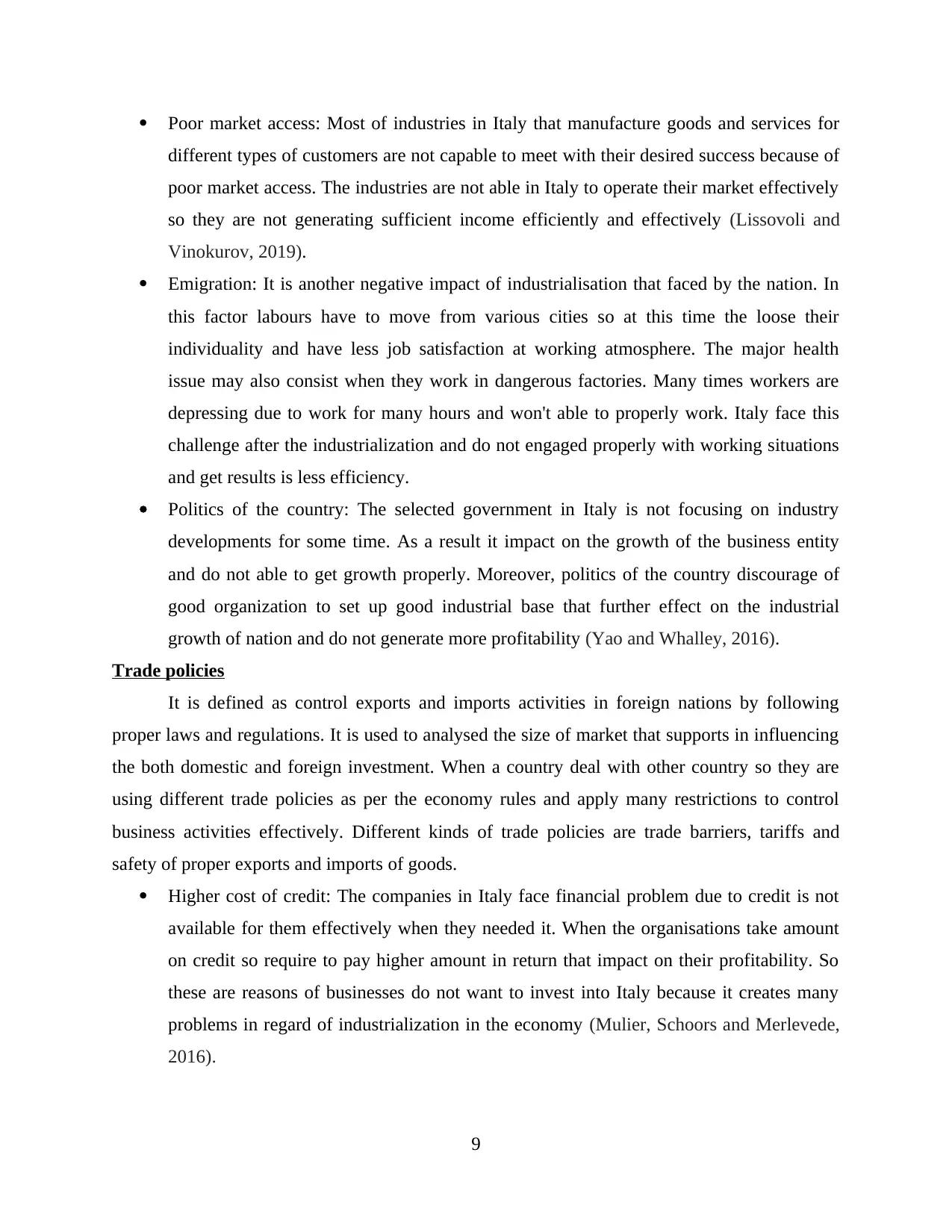
Poor market access: Most of industries in Italy that manufacture goods and services for
different types of customers are not capable to meet with their desired success because of
poor market access. The industries are not able in Italy to operate their market effectively
so they are not generating sufficient income efficiently and effectively (Lissovoli and
Vinokurov, 2019).
Emigration: It is another negative impact of industrialisation that faced by the nation. In
this factor labours have to move from various cities so at this time the loose their
individuality and have less job satisfaction at working atmosphere. The major health
issue may also consist when they work in dangerous factories. Many times workers are
depressing due to work for many hours and won't able to properly work. Italy face this
challenge after the industrialization and do not engaged properly with working situations
and get results is less efficiency.
Politics of the country: The selected government in Italy is not focusing on industry
developments for some time. As a result it impact on the growth of the business entity
and do not able to get growth properly. Moreover, politics of the country discourage of
good organization to set up good industrial base that further effect on the industrial
growth of nation and do not generate more profitability (Yao and Whalley, 2016).
Trade policies
It is defined as control exports and imports activities in foreign nations by following
proper laws and regulations. It is used to analysed the size of market that supports in influencing
the both domestic and foreign investment. When a country deal with other country so they are
using different trade policies as per the economy rules and apply many restrictions to control
business activities effectively. Different kinds of trade policies are trade barriers, tariffs and
safety of proper exports and imports of goods.
Higher cost of credit: The companies in Italy face financial problem due to credit is not
available for them effectively when they needed it. When the organisations take amount
on credit so require to pay higher amount in return that impact on their profitability. So
these are reasons of businesses do not want to invest into Italy because it creates many
problems in regard of industrialization in the economy (Mulier, Schoors and Merlevede,
2016).
9
different types of customers are not capable to meet with their desired success because of
poor market access. The industries are not able in Italy to operate their market effectively
so they are not generating sufficient income efficiently and effectively (Lissovoli and
Vinokurov, 2019).
Emigration: It is another negative impact of industrialisation that faced by the nation. In
this factor labours have to move from various cities so at this time the loose their
individuality and have less job satisfaction at working atmosphere. The major health
issue may also consist when they work in dangerous factories. Many times workers are
depressing due to work for many hours and won't able to properly work. Italy face this
challenge after the industrialization and do not engaged properly with working situations
and get results is less efficiency.
Politics of the country: The selected government in Italy is not focusing on industry
developments for some time. As a result it impact on the growth of the business entity
and do not able to get growth properly. Moreover, politics of the country discourage of
good organization to set up good industrial base that further effect on the industrial
growth of nation and do not generate more profitability (Yao and Whalley, 2016).
Trade policies
It is defined as control exports and imports activities in foreign nations by following
proper laws and regulations. It is used to analysed the size of market that supports in influencing
the both domestic and foreign investment. When a country deal with other country so they are
using different trade policies as per the economy rules and apply many restrictions to control
business activities effectively. Different kinds of trade policies are trade barriers, tariffs and
safety of proper exports and imports of goods.
Higher cost of credit: The companies in Italy face financial problem due to credit is not
available for them effectively when they needed it. When the organisations take amount
on credit so require to pay higher amount in return that impact on their profitability. So
these are reasons of businesses do not want to invest into Italy because it creates many
problems in regard of industrialization in the economy (Mulier, Schoors and Merlevede,
2016).
9
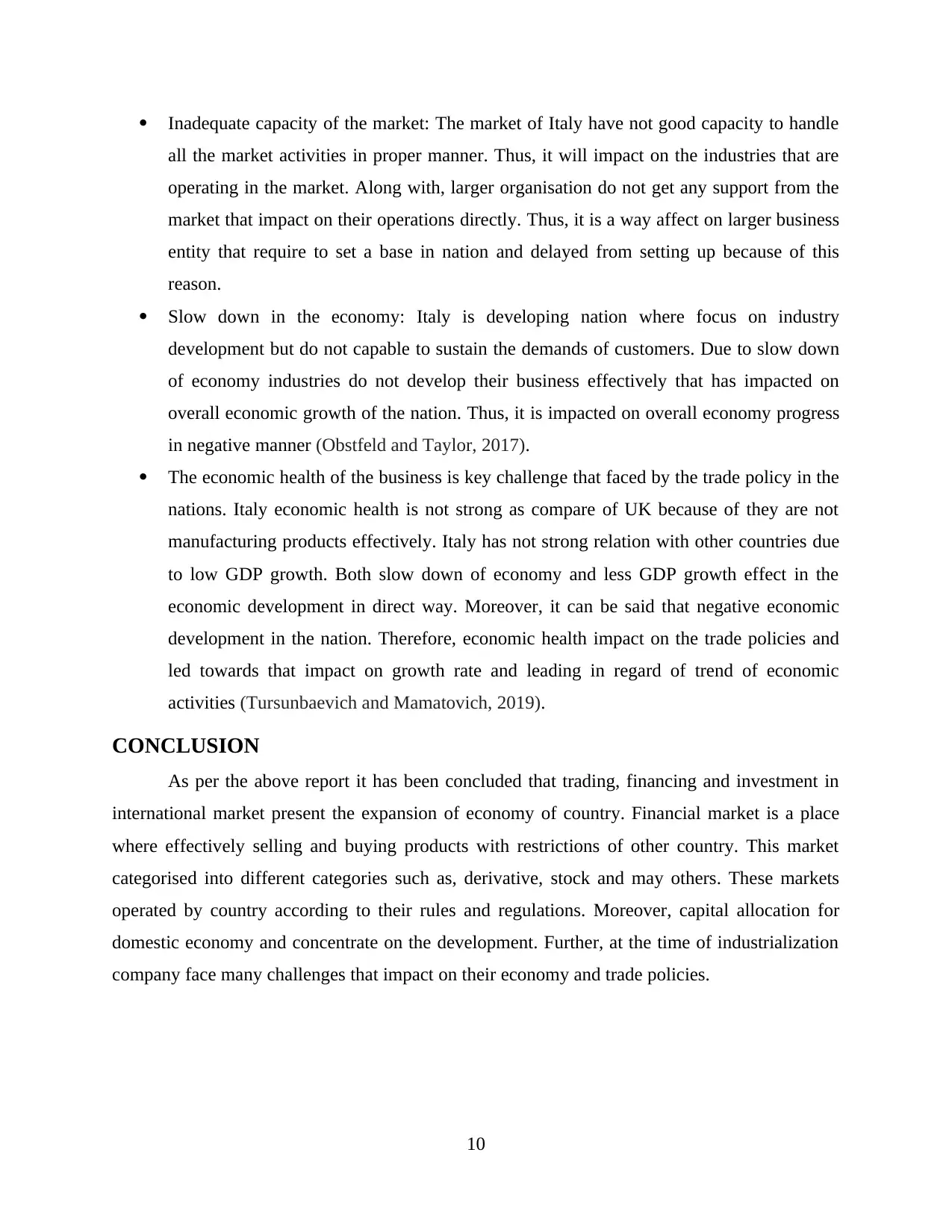
Inadequate capacity of the market: The market of Italy have not good capacity to handle
all the market activities in proper manner. Thus, it will impact on the industries that are
operating in the market. Along with, larger organisation do not get any support from the
market that impact on their operations directly. Thus, it is a way affect on larger business
entity that require to set a base in nation and delayed from setting up because of this
reason.
Slow down in the economy: Italy is developing nation where focus on industry
development but do not capable to sustain the demands of customers. Due to slow down
of economy industries do not develop their business effectively that has impacted on
overall economic growth of the nation. Thus, it is impacted on overall economy progress
in negative manner (Obstfeld and Taylor, 2017).
The economic health of the business is key challenge that faced by the trade policy in the
nations. Italy economic health is not strong as compare of UK because of they are not
manufacturing products effectively. Italy has not strong relation with other countries due
to low GDP growth. Both slow down of economy and less GDP growth effect in the
economic development in direct way. Moreover, it can be said that negative economic
development in the nation. Therefore, economic health impact on the trade policies and
led towards that impact on growth rate and leading in regard of trend of economic
activities (Tursunbaevich and Mamatovich, 2019).
CONCLUSION
As per the above report it has been concluded that trading, financing and investment in
international market present the expansion of economy of country. Financial market is a place
where effectively selling and buying products with restrictions of other country. This market
categorised into different categories such as, derivative, stock and may others. These markets
operated by country according to their rules and regulations. Moreover, capital allocation for
domestic economy and concentrate on the development. Further, at the time of industrialization
company face many challenges that impact on their economy and trade policies.
10
all the market activities in proper manner. Thus, it will impact on the industries that are
operating in the market. Along with, larger organisation do not get any support from the
market that impact on their operations directly. Thus, it is a way affect on larger business
entity that require to set a base in nation and delayed from setting up because of this
reason.
Slow down in the economy: Italy is developing nation where focus on industry
development but do not capable to sustain the demands of customers. Due to slow down
of economy industries do not develop their business effectively that has impacted on
overall economic growth of the nation. Thus, it is impacted on overall economy progress
in negative manner (Obstfeld and Taylor, 2017).
The economic health of the business is key challenge that faced by the trade policy in the
nations. Italy economic health is not strong as compare of UK because of they are not
manufacturing products effectively. Italy has not strong relation with other countries due
to low GDP growth. Both slow down of economy and less GDP growth effect in the
economic development in direct way. Moreover, it can be said that negative economic
development in the nation. Therefore, economic health impact on the trade policies and
led towards that impact on growth rate and leading in regard of trend of economic
activities (Tursunbaevich and Mamatovich, 2019).
CONCLUSION
As per the above report it has been concluded that trading, financing and investment in
international market present the expansion of economy of country. Financial market is a place
where effectively selling and buying products with restrictions of other country. This market
categorised into different categories such as, derivative, stock and may others. These markets
operated by country according to their rules and regulations. Moreover, capital allocation for
domestic economy and concentrate on the development. Further, at the time of industrialization
company face many challenges that impact on their economy and trade policies.
10
⊘ This is a preview!⊘
Do you want full access?
Subscribe today to unlock all pages.

Trusted by 1+ million students worldwide
1 out of 15
Related Documents
Your All-in-One AI-Powered Toolkit for Academic Success.
+13062052269
info@desklib.com
Available 24*7 on WhatsApp / Email
![[object Object]](/_next/static/media/star-bottom.7253800d.svg)
Unlock your academic potential
Copyright © 2020–2026 A2Z Services. All Rights Reserved. Developed and managed by ZUCOL.



